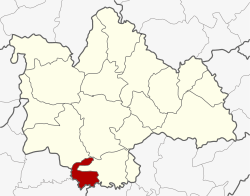Khong Chai District
Khong Chai (Thai: ฆ้องชัย, pronounced [kʰɔ́ːŋ t͡ɕʰāj]) is a district (amphoe) in the southern part of Kalasin Province, northeastern Thailand.
Khong Chai ฆ้องชัย | |
|---|---|
 District location in Kalasin Province | |
| Coordinates: 16°15′42″N 103°27′30″E | |
| Country | Thailand |
| Province | Kalasin |
| Seat | Khong Chai Phatthana |
| Area | |
| • Total | 128.3 km2 (49.5 sq mi) |
| Population (2005) | |
| • Total | 27,098 |
| • Density | 211.2/km2 (547/sq mi) |
| Time zone | UTC+7 (ICT) |
| Postal code | 46130 |
| Geocode | 4618 |
Geography
Neighboring districts are (from the north clockwise) Yang Talat, Mueang Kalasin, Kamalasai of Kalasin Province, Changhan of Roi Et Province, Mueang Maha Sarakham and Kantharawichai of Maha Sarakham Province.
History
Mueang Fa Daet Song Yang (Thai: เมืองฟ้าแดดสงยาง) is the site of a prehistoric community surrounded by earthen mounds about five kilometres long. Evidence of its civilization are religious ruins in and around it, and a large concentration of boundary stones called bai sema or sema hin (ใบเสมา, เสมาหิน).[1]
The minor district (king amphoe) was split off from Kamalasai District on 1 July 1997.[2]
On 15 May 2007, all 81 minor districts were upgraded to full districts.[3] With publication in the Royal Gazette on 24 August, the upgrade became official.[4]
Economy
The district is the site of some of Thailand's largest e-waste recycling businesses.[5] Tambon Khok Sa-at in particular has 154 households that purchase old electronic devices, sort them, and extract scrap electronics for materials that can be reused or recycled and sell them to a third party. They process about 1,000 tonnes of scrap per month. An environmental issue is the remaining 24 tonnes of worthless material that must be disposed of. Absent any local disposal facilities, the scrap is trucked to incinerators in Sa Kaeo and Saraburi. Health officials maintain that levels of contaminants are low and do not pose a threat to people's health or the ecosystem.[5]
Administration
The district is divided into five sub-districts (tambons), which are further subdivided into 48 villages (mubans). There are no municipal (thesaban) areas, and five tambon administrative organizations (TAO).
| No. | Name | Thai name | Villages | Pop. | |
|---|---|---|---|---|---|
| 1. | Khong Chai Phatthana | ฆ้องชัยพัฒนา | 11 | 6,658 | |
| 2. | Lao Klang | เหล่ากลาง | 8 | 4,541 | |
| 3. | Khok Sa-at | โคกสะอาด | 12 | 7,531 | |
| 4. | Non Sila Loeng | โนนศิลาเลิง | 9 | 4,556 | |
| 5. | Lam Chi | ลำชี | 8 | 3,812 |
References
- Phetsanghan, Phairot (2009). "Sema Hin Isan, the Origin of the Temple Boundary Stones in Northeast Thailand". The Social Sciences. 4 (2): 186–190. Archived from the original (PDF) on 2013-07-31. Retrieved 31 Jul 2013.
...Field research was conducted primarily at the ancient community of Muang Fah Daed Sohn [sic] Yang where 432 Sema Hin stones have been identified and registered with the Department of Fine Arts
- ประกาศกระทรวงมหาดไทย เรื่อง แบ่งเขตท้องที่อำเภอกมลาไสย จังหวัดกาฬสินธุ์ ตั้งเป็นกิ่งอำเภอฆ้องชัย (PDF). Royal Gazette (in Thai). 114 (Special 51 ง): 4. 25 Jun 1997.
- แถลงผลการประชุม ครม. ประจำวันที่ 15 พ.ค. 2550. Manager Online (in Thai).
- พระราชกฤษฎีกาตั้งอำเภอฆ้องชัย...และอำเภอเหล่าเสือโก้ก พ.ศ. ๒๕๕๐ (PDF). Royal Gazette (in Thai). 124 (46 ก): 14–21. 24 Aug 2007.
- Phuphuangpet, Yongyuth (27 August 2018). "E-waste sorting 'a valid source of income'". Bangkok Post. Retrieved 27 August 2018.